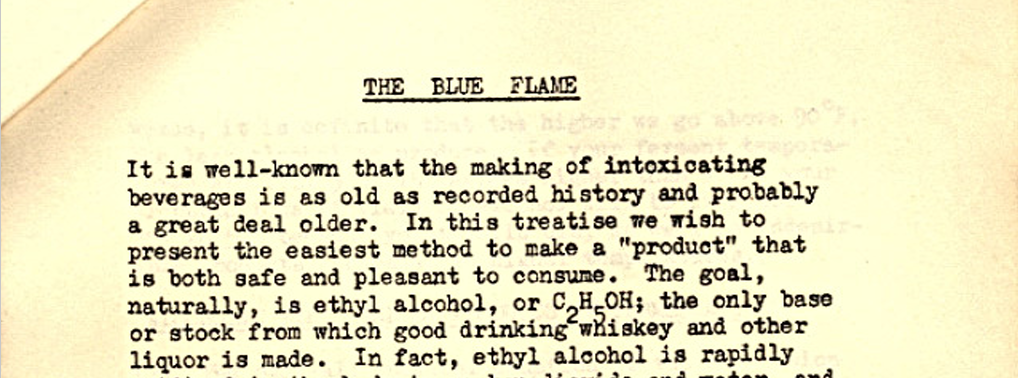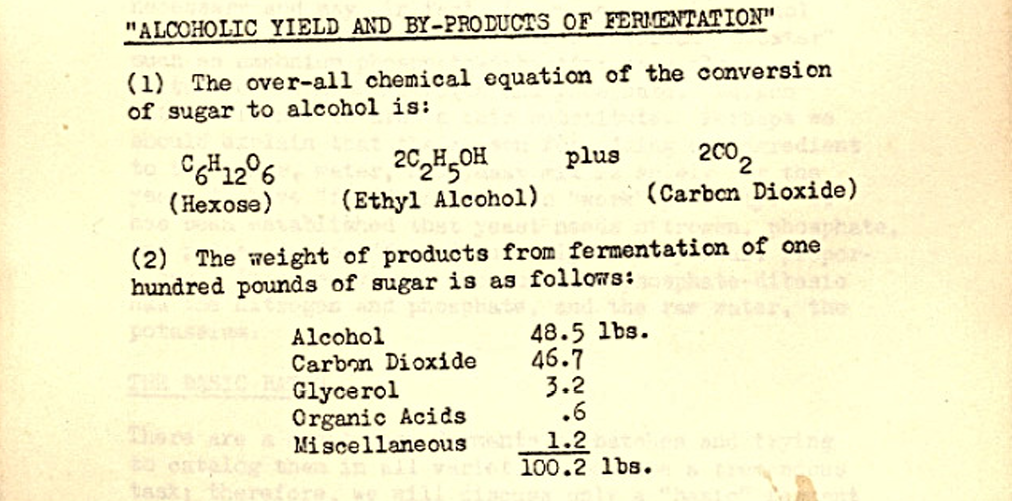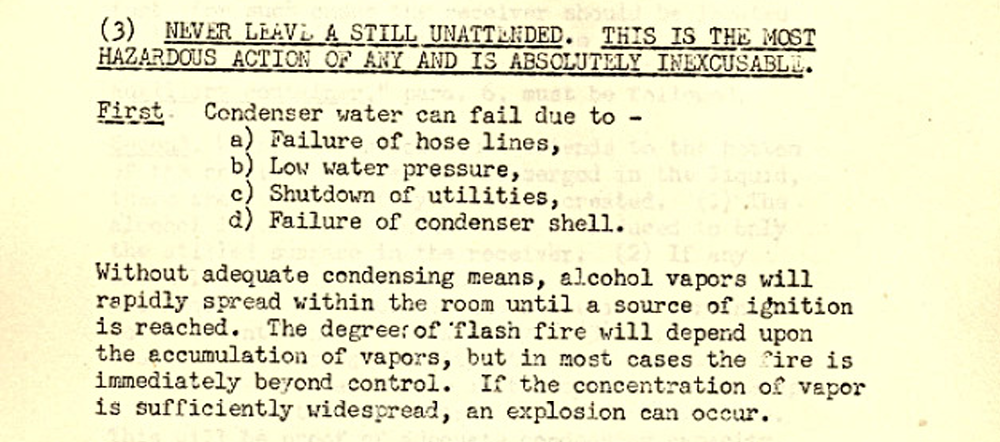Siddiqui and the 'Blue Flame' manual: Making moonshine in Saudi Arabia

On 16 November 1951, British vice-consul Cyril Ousman was hosting a party with friends at his house in Jeddah, on Saudi Arabia's west coast.
One of these guests was 19-year-old Prince Mishari bin Abdulaziz Al Saud, son of King Abdulaziz, who had founded the kingdom just 22 years earlier.
According to eyewitnesses, the young prince became severely drunk and began making advances on a female guest. Eventually, Ousman expelled Mishari from the party.
The next day, Mishari - reportedly still drunk - came back with a gun and shot Ousman dead, as well as wounding his wife.
The furious king arrested his son and, according to a contemporary Time article, "offered Ousman's wife's the privilege of prescribing his death in any way she saw fit, with the added promise that his head should be stuck on a pike outside the British embassy."
Stay informed with MEE's newsletters
Sign up to get the latest alerts, insights and analysis, starting with Turkey Unpacked
Ousman's wife declined the offer and the prince was given a jail sentence and lashes - but in the king's mind something more had to be done and ultimately, he decided that alcohol was to blame for his son's actions.
Shortly after, he imposed a total ban on alcohol in the country.
Though alcohol had already been highly restricted to a small number of government-approved stores, the move enraged foreign expats and diplomats, particularly those working in the Aramco oil company that was central to the kingdom's economy and influence.
According to Time, by December 1952, "twenty Aramco workers had already quit, and more were threatening to, unless the company could persuade the King to repeal prohibition".
"Damn it all," one oil worker told the magazine.
"A tough Oklahoma oil driller just isn't going to be satisfied to work here for six days a week and then relax with a bottle of Coca-Cola."
But despite the anger from expats and more liberal Saudi Arabians, the total alcohol ban remained in place for more than 70 years, even as conservative neighbouring states such as Qatar, Bahrain, and the United Arab Emirates allowed restricted consumption in hotels and other venues.
Enter the Blue Flame manual.
Emerging shortly after the alcohol ban, the anonymously-authored Blue Flame manual provided instructions on home-brewing and distilling and soon became a phenomenon amongst the expat communities of Saudi Arabia, particularly the oil workers, from where the "blue flame" name was coined.
New arrivals to the oil fields could buy a still that could distill spirits for $100 and were given a copy of the booklet.
"It is well known that the making of intoxicating beverages is as old as recorded history and probably a great deal older," reads the opening line of the manual.
"In this treatise we wish to present the easiest method to make a 'product' that is both safe and pleasant to consume."
The brew produced was nicknamed Siddiqui, translating from Arabic as "my friend", and sometimes contracted further to "Sid" amongst its drinkers.
For many decades the manual was one of the only methods by which a "tough Oklahoma oil driller" could enjoy a drink in Saudi Arabia, particularly after Islamic revivalism in the late 1970s saw the kingdom impose even tighter social restrictions.
However, in January it was announced that after more than 70 years, the first liquor store would be opening in the kingdom, albeit catering exclusively to foreign non-Muslim diplomats.
While restrictions remain in place across the country, many see the change as indicative of the direction the country is heading under Crown Prince Mohammed Bin Salman - a direction not everyone is happy with.
'I grew up making Siddiqui'
For those expats who grew up in Saudi Arabia in the 20th century - sometimes affectionately referred to as "Aramco brats" - the homebrew and distilleries produced from the Blue Flame manual are a prominent memory of life in the towns and compounds they lived in.
Nigel Brown was one of them, moving with his family from the UK to the Saudi kingdom in 1973 when he was just five years old.
"I grew up making Siddiqui in our garage. I helped my father for over 15 years," he told Middle East Eye.
Families played a major role in the distilling process, looking after the stills and other equipment while the father went to work. Brown’s father was involved in the installation of transmission lines in Saudi Arabia’s Eastern Province, the heart of the country’s oil production industry.
He would go on to partly follow in his father’s footsteps, working on the installation of telecom infrastructure in the early 1990s.
Expats would flood to their home every weekend.
"My parents loved to entertain - they had Mike's English Pub on a little placard over our bar in the house. And of course, we had every Scottish, every Irish, every British holiday you could ever imagine… any excuse to have a party on the weekend."
Brown today is founder and CEO of Siddiqui Rums, a distiller based in the US that uses the recipes in the Blue Flame manual to produce spirits for distribution around the world.
It is a labour of love for Brown and the other former Saudi expats involved in the company, taking the once underground distilling secrets they remember from their time living in the Gulf and producing an authentic - and legal - beverage.
Brown compared it to cooks in the kitchen: "Not all cooks are equal, right?"
"The ones that can really cook well, make an incredible product unlike anything I've ever tried… the ones that can't cook, of course, it's not that great."
Siddiqui generally could be divided into "brown" and "white" varieties, or a dark spirit and a clear spirit respectively.
Rick Chimblo, another Siddiqui Rums co-founder who grew up near Brown, said whole families contributed to the production of Siddiqui.
"It was heavy work with 100-pound bags of sugar and up to 50 gallons of liquid. Sometimes while the husband was at work, the wife would watch the still for safety and would simply ‘pull the plug’ if things were not ‘quite right’," he told MEE.
Contrary to popular belief that there were "no women moonshiners", Chimblo said, "many women become creative making liqueurs using the ‘uncut’ white".
Chimblo, who described himself as a "desert moonshiner", said the original samples used to develop Siddiqui Rum’s current products were produced "in my beloved still ‘Sally’" that he built in Saudi Arabia and secretly shipped back to the US when he retired.
'So who's making the best?'
The idea of "moonshine" in the popular imagination is of an incendiary concoction that at best passes for barely drinkable and at worst is downright toxic. In other countries with alcohol restrictions, such as the US in the 1920s, or contemporary Iran, numerous deaths have been attributed to bootleg alcohol.
However, while Siddiqui was not risk-free, the fact that it was produced by skilled engineers from a well-crafted, scientifically prepared blueprint made the situation rather different.
"When you get a chemical engineer involved making moonshine, it is like, super high perfection. And then there's competition between all the engineers," said Brown.
"So who's making the best?"
One former Aramco worker who spent many years distilling - and selling - Siddiqui in Saudi Arabia told MEE that different distillers brought techniques with them, although using the Blue Flame as a blueprint.
Steve – not his real name - said various American products could be bought at diplomatic institutions.
"One of the things they sold there were oak chips for smoking on your barbecue and one of the ones you could get was Jack Daniel's barrel oak chips," he said.
"Your white was your vodka. When the Americans made brown, it was like Jack Daniel's [whisky]."
Steve said the process was often unpredictable, but he fondly remembers the years he spent in the underground scene.
Now living in Birmingham, after spending 1981 to 2008 in the kingdom, he showed MEE a picture of one of the stills used to make the Siddiqui, covering up the face of the distiller with a post-it note.
Brewing in the sun
Chimblo said that to deal with the various restrictions and limited materials, it was necessary to be creative.
"In order to have enough Brown ready for the big parties, we would make 'sun Brown,'" he said.
He compared it to sun tea, the process of slow-brewing tea in the sun and then serving it with ice.
"We did the same thing with a gallon jug of white and about one cup of special wood chips. We were always being inventive," Chimblo said.
For those who were willing to shoulder the risk, it could also be a lucrative business.
"One English guy I know was literally a millionaire… I happen to know that he sold it to some influential people," said Steve.
Another distiller, he said, would regularly travel to the nearby Saudi city of Khobar to buy oats and brans from an animal feed merchant to use in his product.
"How do you age Brown? The answer is you put it in a glass bottle only half full and you lay that bottle on its side in the freezer," he said.
"You put it in there for three or four days and you stand it on the cupboard for a week and you put it back in... every time you do that it ages it by a few years."
Despite the relative skill and expertise of the distillers and brewers, accidents and injuries were still relatively common.
"NEVER LEAVE A STILL UNATTENDED. THIS IS THE MOST HAZARDOUS ACTION OF ANY AND IS ABSOLUTELY INEXCUSABLE" reads page 9 of the Blue Flame, underlined and in block capitals.
The need to keep their product monitored was one reason whole families became involved in distilling and those who didn't took a major risk.
Steve said British expats whose stills caught fire would refer to them euphemistically as "chip pan fires" when discussing.
He also mentioned one man living in Aramco housing - which he characterised as being a lounge and kitchen downstairs and a bedroom and bathroom upstairs - who lost control of his Siddiqui.
"Well, this guy, he had an explosion - he blew the ceiling into the roof void," said Steve.
"A couple of Filipinos went and fixed it up... police never found out."
'Saudi Arabians did buy'
Although he said that Aramco management generally "didn't give a monkeys" about their alcohol making, there were still risks and red lines.
"Nobody sold to Saudi Arabians. If you got caught selling to expats, it was a whole different thing from selling to Saudi Arabians," Steve said.
"But a whole lot of Saudi Arabians did buy," he added, including one "influential Saudi businesswoman" who he said would only buy her "white" from him.
'If you got caught selling to expats, it was a whole different thing from selling to Saudi Arabians'
- Steve, expat
Numerous techniques were developed to hide the Siddiqui. Although regular police weren’t allowed on Aramco property without invitation, it was still technically prohibited and of course, any trips further afield were fraught with risk.
Steve said if you were inclined to go on a picnic to the desert dunes, a popular pastime for Saudi Arabians and expats alike, the best idea with alcohol was to put green dye in the Siddiqui to make it look like engine coolant.
If discovered drinking in the desert, "you would rub a hole in the ground and bury the Sid in the ground".
Reforms and crackdownBrown says he is optimistic that he might see his product sold openly in Saudi Arabia one day.
He said Siddiqui Rums had already found a distributor in neighbouring Abu Dhabi, the capital of another nearby state that has relaxed its alcohol restrictions in recent years, and with the apparently liberalising trajectory of the kingdom, Saudi Arabia may not be far behind.
But although Brown is effusive about bin Salman's plans, particularly his much-trailed Neom megacity project, such reforms have been imposed alongside widespread repression of dissent in the country.
The abolition of a long-criticised law criminalising women drivers took place as the government imprisoned many of those who had been advocating women's rights reforms in the first place.
The crown prince has also launched operations abroad targeting dissidents, most notoriously against Saudi journalist Jamal Khashoggi, who was murdered in the kingdom's consulate in Istanbul in 2018. Though bin Salman denies having ordered the killing, the CIA and other spy agencies have held him directly responsible.
The loosening of laws on alcohol consumption is also indicative of the fact that the country is still an absolute monarchy - perhaps more absolute than ever - and it remains very debatable whether the liberalisation of alcohol laws would have been passed through a democratic vote in the still very conservative country.
Danah Almayouf, a US-based Saudi artist and critic of the crown prince, said that she supported greater alcohol legalisation in Saudi Arabia - particularly if it meant greater regulation of potentially dangerous homemade products - but said that it served in part to "whitewash" the kingdom's rights record.
"Saudi Arabia is trying to show that they're liberal, opening up. However, that's not the right way to do it - if you want people to accept Saudi Arabia as a democratic country or whatever it is, you have to start by releasing all the activists in prison... that's a good gesture that Saudi is changing for the better," she told MEE.
For Brown, however, for all the kingdom’s complicated relationship with alcohol, the Blue Flame manual contributed greatly to the transformation of the country from a relatively poor nomadic society into the world’s global energy powerhouse by creating a conducive environment for the experienced foreign engineers who helped develop the country’s fledgling oil sector.
"They wouldn't have brought their families - it would have been a sea of bachelors going out for three-month stints and then leaving. Because if you can't have a drink, that's going to be really, really hard on the oil industry guys," he said.
"So, you know, when you think about it, Siddiqui was one of the foundational stones that actually helped build Saudi Arabia, in a roundabout way."
Middle East Eye delivers independent and unrivalled coverage and analysis of the Middle East, North Africa and beyond. To learn more about republishing this content and the associated fees, please fill out this form. More about MEE can be found here.










